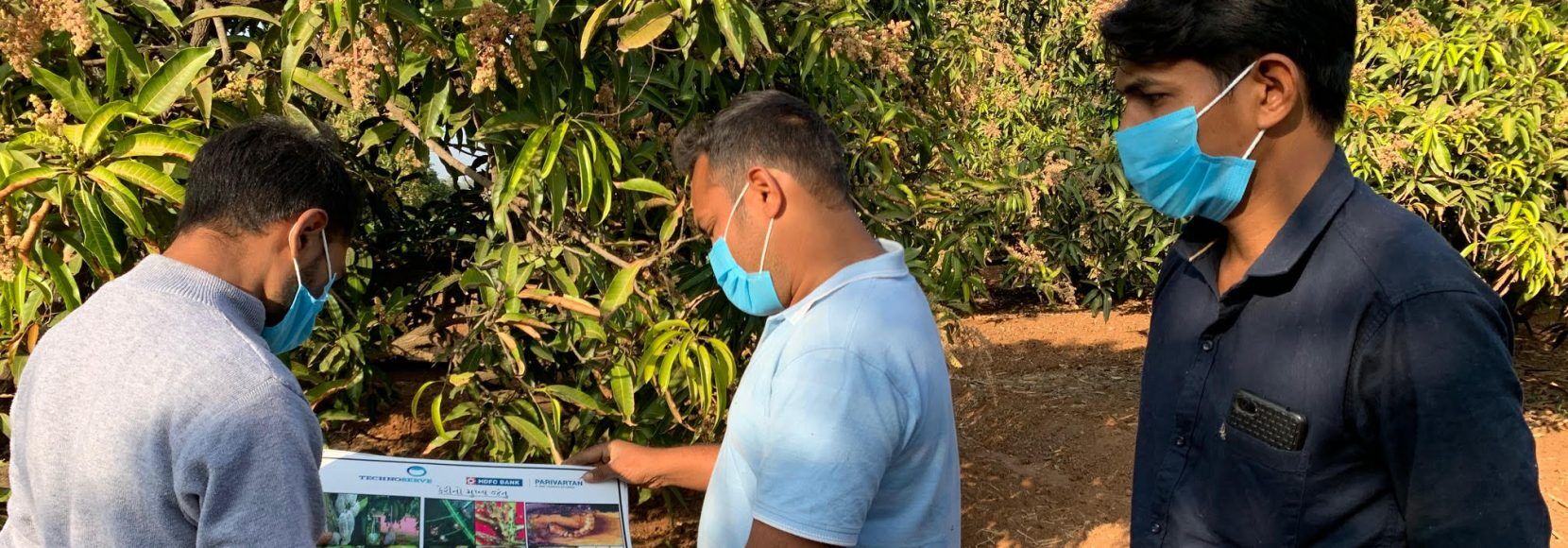How Mango Cultivation in India Leads to Better Incomes for Farmers
Smallholder mango farmers in India rely on income from their fruit trees to support their families. But low productivity, limited access to markets, and water scarcity create obstacles to growth. A TechnoServe program is now helping these farmers access the knowledge and connections they need to sustainably increase their incomes.
Farmers like 60-year-old Popatbhai Thumman see mango cultivation in India as a pathway out of poverty. Popatbhai lives in the coastal state of Gujarat, where
- 16% of the state’s population lives in poverty
- 27% of rural households remain in debt
- 39% of the population is illiterate
To reduce poverty and increase rural development, a flourishing agricultural sector is essential. Agriculture engages 43% of India’s workforce, and approximately two-thirds of the population in Gujarat earns its livelihood through farming.
Challenges with Mango Cultivation in India
But smallholder farmers like Popatbhai face a range of challenges, including:
- Low productivity on the farm
- Limited access to markets
- Unreliable access to water
Today, Popatbhai has 225 Kesar mango trees — a variety known for its bright color and sweet taste. His trees flourish under his watchful eye, and they produce enough fruit for him to support his family of seven, including his wife, two sons, daughter-in-law, and two grandchildren.
But that was not always the case. Popatbhai started growing mango in 2011 on his small plot of land, but plant diseases and pests consistently reduced his yields and limited his ability to earn a living income from his harvests. In 2020, he joined a TechnoServe program that helped him access markets and make important changes on his farm.
Agronomy Training Helps Farmers Grow Incomes
TechnoServe’s Sustainable Livelihoods for Farming Households program in the Gir Somnath region — a partnership with HDFC Bank — aims to help around 1,000 farmers like Popatbhai realize the full potential of their mangoes by training them on improved growing techniques, working to strengthen farmer institutions, and building local capacity to manage critical water resources sustainably.
While visiting rural communities like Popatbhai’s, the TechnoServe team noted the potential that the Kesar mango variety has to improve the livelihoods of agricultural households in the region. Cultivating mango can bring farmers revenue of over $2,700 per hectare. However, due to the challenges above, farms were often not reaching their full potential.
To increase the earning potential of mango farmers in the region, TechnoServe developed a four-part training module and recruited farmers from 10 communities to join the program.
The team carried out individual and group training sessions with farmers, using picture-based presentations and practical demonstrations to help farmers understand the techniques. These 1,000+ farmers now apply these lessons on their own mango orchards to increase their yields and reap considerable benefits.
Nurturing Mango Trees Puts Food on the Table for Farmers
Prior to joining the TechnoServe program, Popatbhai and many other mango farmers were at a loss for how to manage common threats to their crops, such as the plant disease “dieback”. Mango dieback is a type of fungus that causes wilting, curling, and drying of leaves on the mango plant. In severe cases, plants can lose all of their leaves and stop flowering, leading to serious losses for farmers.
Having an orchard is one thing, but nurturing those trees so they grow healthily to bear flowers that turn into fruits that put food on our plates is another.”
— Popatbhai Thumman, mango farmer, India
After attending the TechnoServe training, Popatbhai is better prepared to handle challenges on the farm. He learned good farming practices, including how to address mango dieback through chuna (limewash or slaked lime in water) painting. He has now painted all the trees in his orchard with limewash, protecting the external surface of the tree against disease-causing pathogens, and is seeing an improvement in his mango yields as a result.
Learning about these tested practices not only built his trust in what TechnoServe has to offer, but also gave him the confidence that he will eventually be able to overcome more long-term problems in his orchard, like erratic fruit-setting, which occurs when the plant’s flowers do not turn into fruit.
Farmers like Popatbhai are now spreading the word about their experience. “I am very excited to be a part of this program,” he says. “I am actively encouraging my fellow farmers in the village to join the program as well.”


